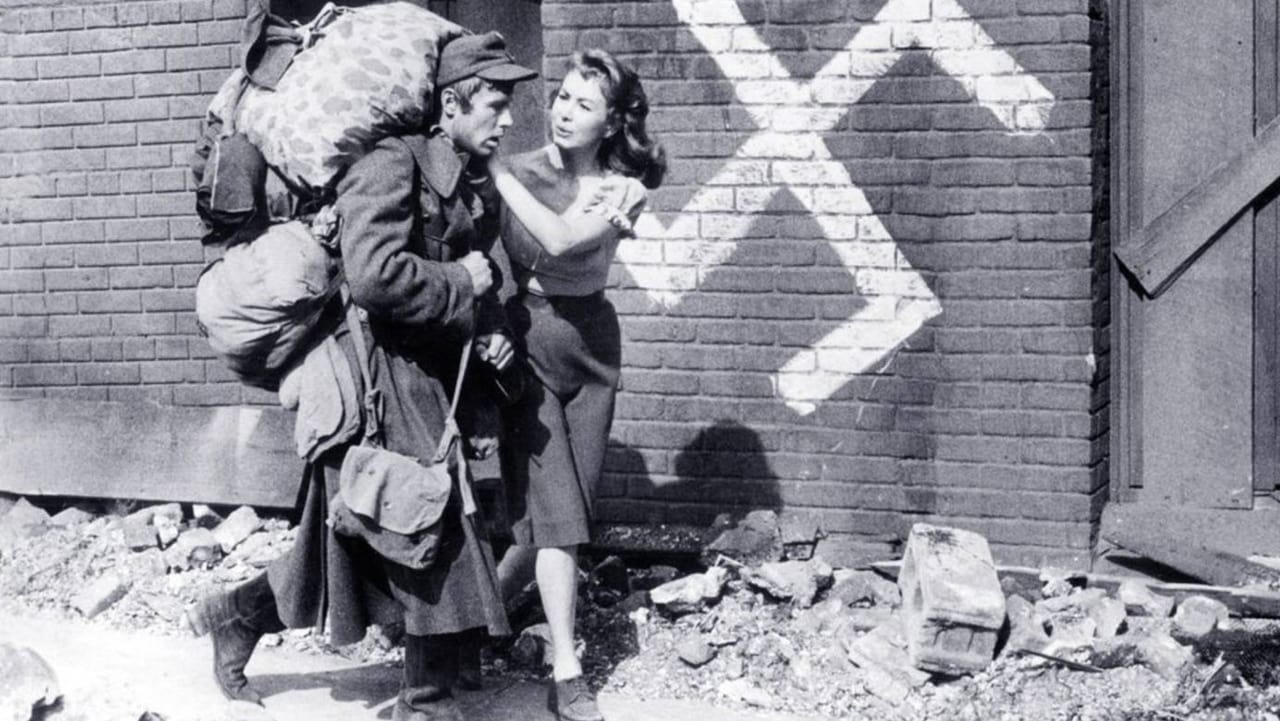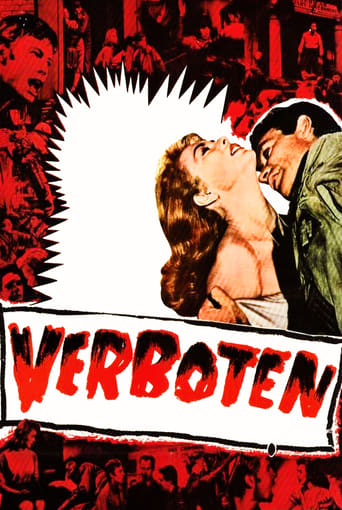

James Best plays the last soldier left in a German village raided by Allied Forces during World War II. He is wounded and nursed to health by a native (Susan Cummings) whose brother is still loyal to a local Nazi group. The couple falls in love and wants to get married, but it is forbidden by Best's commanding officer. Including some gritty footage of Nazi death camps and a daring rescue by Best of his girlfriend's brother from a burning train, this is one of Samuel Fuller's most underrated films. It was produced after RKO Radio Pictures had closed in 1956, sold to Desi Arnaz and General Tire and Rubber Company. There's an unforgettable opening scene, a shootout to the tune of Bethoven's 5th Symphony.
... View Morean old movie. not exactly for time passing from its birth but for the themes who are always fresh, for the sets, for the measure of story who impress again and again. a war film and more that. because important remains the way to translate in image, with grace, delicacy and courage a dark side of reality. the photographs, the wallpapers, the dialogs, the scenes from Nuenberg trial, the story story itself are tools for a clear and objective picture of period. and that fact remain great , more important, in fact, than the artistic virtues. the equilibrium - that is the essential thing who defines Verboten ! and who gives to its poetic moments more force.
... View More***SPOILERS*** One of director's Samuel Fuller's lesser known movies that watching it now, over forty years after it's release in 1959, strikes a cord in it's uncanny similarity in what's happening in Iraq/Afghanistan with the US Military engaged in guerrilla war-fear with local insurgents.Basically a love story between a GI and German woman the movie goes a lot deeper into the disenchantment of the German people back in 1945 who felt that their being slowly driven to mass starvation by the occupying US military. Being saved from being shot on the spot by the advancing Waffen SS by a German girl Helga, Susan Coming, GI Sgt. David Brent, James Best, later marries her after the war; even though it's forbidden by the US Military Occupying Gvernment for Americans to fraternized with the local German population.David getting a job in the food distribution section of the US 45th Infantry Division which incidentally had an Indian Nazi-like swastika as it's combat symbol, until 1940 when it was changed to a Thunder-bird, has no trouble getting his wife and her infirmed mother Frau Schiller, Anna Hope, and younger brother Franz, Harold Daye, all the food and medicine that they need. But the other Germans in the little town of Rothbach are on the brink of revolt due to the corruption and black-market racketeering by Americans and their hand-picked Germans employees handling the desperately needed supplies.With the defeated and disbanded Nazis seeing a chance to regain power they start to form guerrilla-like units, among the German Hitler youth and Army POW's, called werewolves that create havoc, much like whats happening today in Iraq, among the US forces in the German Bavarian province where Rothbach is located. The head of the local werewolf unit is Helga's childhood friend Bruno, Tom Pittman, who's both a fanatical Nazi as well as working undercover, for the werewolves, for the US Military Government in town.Bruno recruits young Franz into the werewolves who at first is very eager to fight for his country against the hated occupying US military. Later when his older sister Helga takes Franz to the Hall of Justice in Nuremberg to see the top Nazis standing trial, and films of what their accused of doing, he quickly changes his mind and turns against Bruno. Bruno who seemed to care even less about his fellow Germans then US military is exposed as a ruthless exploiter of his own people by fellow werewolf Helmuth, Dick Kallman. Thats when Helmuth found out that Bruno was using the werewolves to pompously, by blowing up supply trains, keep much needed medical equipment and drugs from the people in Rothbach. Thus making it look like the US was doing it in order to get them to revolt against the Americans.Having Helmuth, on the orders of Bruno, beaten tried and executed for treason right in front of him has now the very troubled, as well as enlightened, Franz decide to get a hold of the secret papers that Bruno has that are plans to take over Germany through a nation-wide werewolf guerrilla war. With all this going on Bruno also takes the time to break-up Helga, who's now pregnant, and Davids marriage by telling David that Helga doesn't love him and only married David to get him to give her and her mother and brother free food and shelter.A bit uneven in parts with the movie trying to balance a love story with a post-war thriller. For a time you almost forget that Helga is even in the movie with it totally focusing on the werewolf movement and when Helga later takes young Franz to Nuremberg it took a while to realize just who she was, David's wife, since you had the impression that she was somehow killed off earlier in the film. James Best as Sgt. David Brant was by far the best actor in the movie, with Tom Pittmans Bruno Eckart a close second. Bests confrontation with Helga towards the end of the film over her taking advantage of him, which turned out to be a big lie made up by Bruno, was as effective emotionally charged and on par with Marlon Brando's electrifying performance in "Streetcar Named Desire".
... View MoreGreat film about an American G.I. who quits the army to marry a German girl who saved his life in the last days of the war. She accepts, but does she do it because she really likes him, or because he can support her with easier access to food and such? Meanwhile, her brother and an old friend form an anti-American terrorist group called the Werewolves, their purpose to drive away the occupants (you might remember the same group playing a major part in Lars von Trier's film Europa (Zentropa)). James Best, best known for his role as Roscoe P. Coltrane in the 1980s television show The Dukes of Hazzard, is shockingly excellent as the American. He should have become a big movie star at this age he reminds me very much of Warren Beatty. The other main actors are good, as well. Fuller's direction is quite good, using a lot of long takes again (although they are not nearly as complex as they were in Park Row; the long takes more often than not consist of long scenes with a lot of dialogue). The only problems lie in the script, as seems to be the case with all of the Fuller films that I've seen. It's not too badly flawed, but it ought to have been expanded, fleshing out major characters and parts of the script. Helga, the wife, goes through a major change, but completely off screen. Therefore, the emotional center rests squarely on Best's shoulders. Fuller also should have killed off the sick mother early in the film. I hope that doesn't sound too harsh! She just doesn't really do anything throughout the film except lie in bed. She has so few lines. But Fuller keeps bringing her up as the film goes on. I would have had her death solidify David and Helga's relationship myself. And the film ends too abruptly, and it lacks payoff. These aren't really the biggest flaws in the world (the way I described them makes them sound bigger than they are). 9/10.
... View More